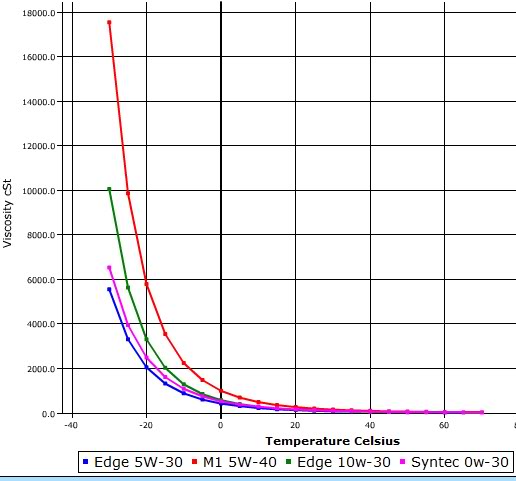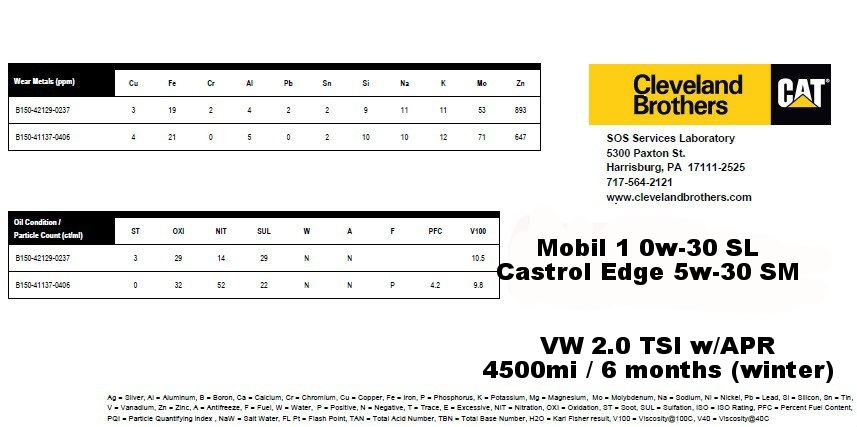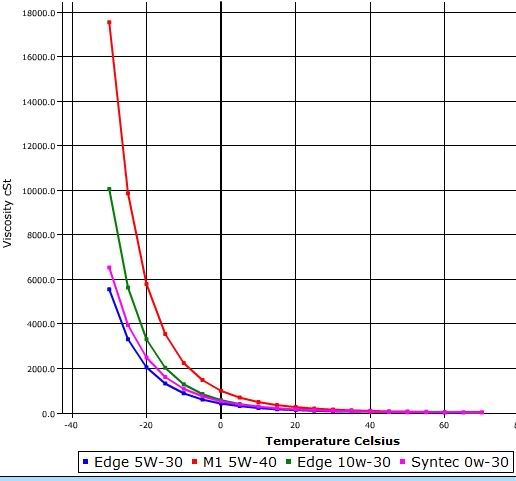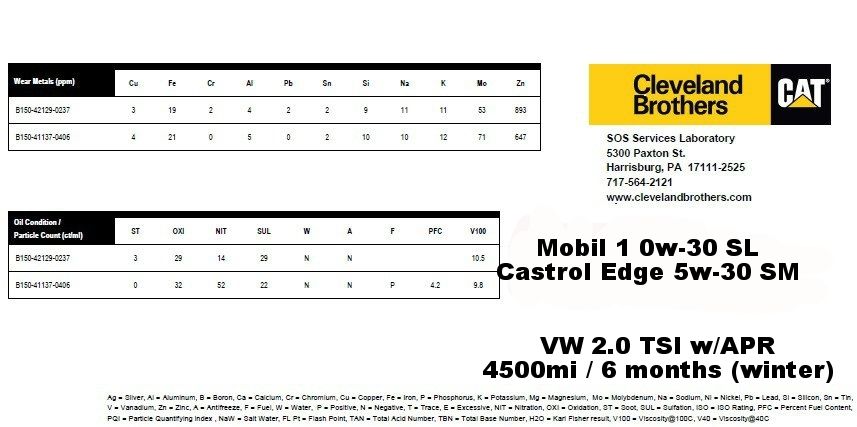Can I use a typical non euro 5W30 synthetic in my car?
#1
My wifes 2010 Audi 2.0 no longer has a powertrain warranty. It doesn't use enough oil to add any between changes. I change the oil every 5K miles using Castrol Edge 5W40. Is the engine really going to be harmed if I use say Castrol Edge 5W30, even though it doesn't meet the VW 502 spec?
#2
AudiWorld Super User

Why not stick with the most common oil of them all: Mobil One 0W40?
It's ~ $25/5qt at Walmart. How are you going to get a cheaper oil, compliant or non-compliant?
It's ~ $25/5qt at Walmart. How are you going to get a cheaper oil, compliant or non-compliant?
#3
Considering the engine warranty has been extended to 8 years and 80k miles, yes, and some dealers getting work for oil consumption issue pushed through even beyond that, I'd stick to compliant oil. It's specified for a reason. Oil passage sizes, oil pump design, piston ring design can all dictate oil grade and additive package. Plus all 5W30 is not created equal. Some will meet spec, but test very different, with slightly different additive packages.
#4
AudiWorld Super User
Why wouldn't you want to use the 5w40?? Thicker oil and proper additives are going to protect it under the harsh temps and conditions this hot running turbo engine puts on the oil. These engines are extremely hard on oil, it nearly looks like draining oil on a TDI after just 5-6k miles.
#5
5w-40 is overly thick in cold, this is why 0w oils were developed. For the purposes of this graph, German Castrol 0w-30 is the same as Mobil 1 0w-40...

Clearly apparent how thicker "A3" oils, 40 weights, including 0w-40 and thick 30 weights are overly thick in cold. For a turbo engine, this flow to the turbos and top end are important. The best cold flow of the bunch is thinner "A5" spec 5w-30 from a $20 jug at WalMart.
Knowing that most driving in North America doesn't heat the oil up, like Euro driving, there was no need for the extra margin built into the A3 VW 502 spec of HT/HS > 3.5cP at +150C...the High Temp / High Sheer rating. We simply don't need the extra visc unless driving hammer-down Euro style for hours on end or towing over mountains.
I went ahead and tested my theory in my 2.0T VW Tiguan 6M APR 1+ Castrol Edge 5w-30 and Mobil 1 0w-30 SL, both thin A5 oils with 2.9cP HT/HS... "American 5w-30".


Clearly apparent how thicker "A3" oils, 40 weights, including 0w-40 and thick 30 weights are overly thick in cold. For a turbo engine, this flow to the turbos and top end are important. The best cold flow of the bunch is thinner "A5" spec 5w-30 from a $20 jug at WalMart.
Knowing that most driving in North America doesn't heat the oil up, like Euro driving, there was no need for the extra margin built into the A3 VW 502 spec of HT/HS > 3.5cP at +150C...the High Temp / High Sheer rating. We simply don't need the extra visc unless driving hammer-down Euro style for hours on end or towing over mountains.
I went ahead and tested my theory in my 2.0T VW Tiguan 6M APR 1+ Castrol Edge 5w-30 and Mobil 1 0w-30 SL, both thin A5 oils with 2.9cP HT/HS... "American 5w-30".

Last edited by Audi Junkie; 01-22-2016 at 09:50 PM.
#6
Lower wear rates than 5w-40s I compared, inc "Euro" 5w-40s like Motul, etc. The only advantage in 5w-40, such as dealer Syntec, lays in how much fuel dilution occurs over extended 10k intervals with our rich low NOx tune in North America.
Since most of us change oil at 5000 miles, we won't have accumulated fuel in our oil. Driving cycle is important too. But...worst case scenario, 5w-40 is a better bet for warranty-type service. I change every 6 months, so it's easy to adjust the visc for the seasons. If someone starts with dealer 5w-40 for summer, they can drain it out for 5w-30 late in the Fall.
Another thing about short trip driving, in cold the oil never gets fully heated, and doesn't boil off excess fuel and condensed water, but nor does it get heated down to it's proper operating visc....it STAYS overly thick. Another reason 5w-30 is a big plus.
Mobil 1 High Miles line features an older SL spec that allows higher additive levels. This is a big plus for our crappy fuel full of alcohol and sulphur. For this reason the "new" low-additive VW 504/507 oils should be avoided, they are not tested with our fuels and react poorly when exposed to it. The M1 High Miles is slightly thicker than typical 5w-30, much thicker in 10w-30, essentially a Euro 30 weight that "meets" VW 502 A3 spec. The 10w-40 is super thick, a stout oil for some applications, maybe ok for mixing with the other grades.
Avoid regular Mobil 1, rather Pennzoil Platinum. Gas-to-Liquid base oil is unbeatable. 5w-30 is ideal. The rule with lube selection is to use the thinnest one that will not produce excess wear. Try a Caterpillar UOA, they are only like $10 if you drop it off.
I'll check back. Hope I answered the question!
Since most of us change oil at 5000 miles, we won't have accumulated fuel in our oil. Driving cycle is important too. But...worst case scenario, 5w-40 is a better bet for warranty-type service. I change every 6 months, so it's easy to adjust the visc for the seasons. If someone starts with dealer 5w-40 for summer, they can drain it out for 5w-30 late in the Fall.
Another thing about short trip driving, in cold the oil never gets fully heated, and doesn't boil off excess fuel and condensed water, but nor does it get heated down to it's proper operating visc....it STAYS overly thick. Another reason 5w-30 is a big plus.
Mobil 1 High Miles line features an older SL spec that allows higher additive levels. This is a big plus for our crappy fuel full of alcohol and sulphur. For this reason the "new" low-additive VW 504/507 oils should be avoided, they are not tested with our fuels and react poorly when exposed to it. The M1 High Miles is slightly thicker than typical 5w-30, much thicker in 10w-30, essentially a Euro 30 weight that "meets" VW 502 A3 spec. The 10w-40 is super thick, a stout oil for some applications, maybe ok for mixing with the other grades.
Avoid regular Mobil 1, rather Pennzoil Platinum. Gas-to-Liquid base oil is unbeatable. 5w-30 is ideal. The rule with lube selection is to use the thinnest one that will not produce excess wear. Try a Caterpillar UOA, they are only like $10 if you drop it off.
I'll check back. Hope I answered the question!
Last edited by Audi Junkie; 01-23-2016 at 10:08 PM.
#7
Manufacturer Product SAE Class VW Standard
Adamol Adamol Multitop Longlife SAE 5W-30 50400/50700
Addinol Addinol Giga light MV 0530 LL SAE 5W-30 50400/50700
Addinol Addinol Mega Light MV 0539 SAE 5W-30 50400/50700
Addinol MEGA STAR SAE 5W-30 50400/50700
Aegean Oil Velox Ultra XT SAE 5W-30 50400/50700
Agip Agip 7008 SAE 5W-30 50400/50700
Agip Formula Future SAE 5W-30 50400/50700
AMAG GAMAPARTS Super LongLife III SAE 5W-30 50400/50700
Aral Aral SuperTronic Longlife III SAE 5W-30 50400/50700
Auto-Teile-Ring Cartechnic Motorenöl Multi SAE 5W-30 50400/50700
Avia Avia Synth 5W-30 Longlife III SAE 5W-30 50400/50700
Avia Aviasynth LSP plus SAE 5W-30 50400/50700
Avia Avilubsynth LSP Plus SAE 5W-30 50400/50700
BayWa Tectrol Speed LL 530 SAE 5W-30 50400/50700
BayWa Tectrol Speed Longlife III SAE 5W-30 50400/50700
BP BP Visco 7000 Longlife III SAE 5W-30 50400/50700
Carat ad-High Tech Longlife III SAE 5W-30 50400/50700
Castrol Castrol Edge SAE 5W-30 50400/50700
Castrol Castrol Edge 5W-30 SAE 5W-30 50400/50700
Castrol Castrol Longlife III SAE 5W-30 50400/50700
Castrol Castrol SLX Professional LL03 SAE 5W-30 50400/50700
Castrol Castrol SLX Professional Longlife III 5W-30 SAE 5W-30 50400/50700
Castrol Castrol SLX Professional Powerflow Longlife III SAE 5W-30 50400/50700
Castrol Castrol SLX Professional Powerflow Longlife III 5W-30 SAE 5W-30 50400/50700
Castrol Castrol TXT 507 00 SAE 5W-30 50400/50700
CENTRO CENTRO Motoröl Longlife III SAE 5W-30 50400/50700
Cyclon Hellas Cyclon F1 V SAE 5W-30 50400/50700
Denicol Denicol Syn Extra Long Life III SAE 5W-30 50400/50700
Elf Elf Excellium TDI SAE 5W-30 50400/50700
Elf Elf Solaris LLX SAE 5W-30 50400/50700
Emka Superpower C-3 SAE 5W-30 50400/50700
EPRO Meisteröl WIV Longlife SAE 5W-30 50400/50700
Eurol Eurol Syntence SAE 5W-30 50400/50700
Finke Aviaction Unique LongLife WIV SAE 5W-30 50400/50700
Fuchs Fuchs Sintolux Force V SAE 5W-30 50400/50700
Fuchs Fuchs TITAN GT1 Longlife III SAE 5W-30 50400/50700
Fuchs Fuchs TITAN GT1 PRO C-3 SAE 5W-30 50400/50700
Galp Galp Formula Longlife III SAE 5W-30 50400/50700
Globus Fachmärkte multilub Longlife III SAE 5W-30 50400/50700
Gulf Gulf Formula GVX SAE 5W-30 50400/50700
Hunold EUROLUB WIV ECO SAE 5W-30 50400/50700
Igol Igol Profive 504/507 SAE 5W-30 50400/50700
Liqui Moly LIQUI MOLY Pro-Engine M600 SAE 5W-30 50400/50700
Liqui Moly LIQUI MOLY Top Tec 4200 SAE 5W-30 50400/50700
Lotos Lotos Quazar LLIII SAE 5W-30 50400/50700
Mabanol Mabanol Xenon Ultra Synth Longlife SAE 5W-30 50400/50700
Meguin megol Motorenoel Compatible SAE 5W-30 50400/50700
Millers Oils XF Longlife SAE 5W-30 50400/50700
Minerva Minerva TSV SAE 5W-30 50400/50700
Mitan Alpine Longlife III SAE 5W-30 50400/50700
Mitan Mitan Monza GP 5W-30 Longlife III SAE 5W-30 50400/50700
Mitan Monza Super Combi SAE 5W-30 50400/50700
Mobil Mobil 1 ESP Formula SAE 5W-30 50400/50700
Mobil Mobil SHC Formula V SAE 5W-30 50400/50700
Mobil Mobil Super 3000 Formula V SAE 5W-30 50400/50700
MOL MOL Dynamic Gold Longlife SAE 5W-30 50400/50700
Motor Oil Hellas EMO SYNTO MAX SAE 5W-30 50400/50700
Motul Feu Vert 50400 507 00 SAE 5W-30 50400/50700
Motul Motol Specific 504 00 507 00 SAE 5W-30 50400/50700
Motul Motul 8100 X-clean + SAE 5W-30 50400/50700
Neste Oil Neste City Pro W Longlife III SAE 5W-30 50400/50700
Norsk-Pennsylvansk DynoCat Voltron LL SAE 5W-30 50400/50700
Oel-Brack Midland Crypto-3 SAE 5W-30 50400/50700
Ölwerke Julius Schindler OJS Econo-Veritas Longlife III 5W-30 SAE 5W-30 50400/50700
OMV OMV BIXXOL special V7 SAE 5W-30 50400/50700
Paz Lubricants & Chemicals Ltd Paz Extreme 507.00 SAE 5W-30 50400/50700
Pennzoil Pennzoil Platinum VX SAE 5W-30 50400/50700
Pennzoil Pennzoil Platinum VX SAE 5W-30 50400/50700
Pennzoil Pennzoil Ultra Euro L SAE 5W-30 50400/50700
Penrite Oil ENVIRO + SAE 5W-30 50400/50700
Pentosin Pento Super Performance III SAE 5W-30 50400/50700
Petronas Petronas Syntium 5000 AV SAE 5W-30 50400/50700
Quaker State Q Diesel Plus SAE 5W-30 50400/50700
Quaker State Q European Engine VX SAE 5W-30 50400/50700
Quaker State QS Q Diesel Plus SAE 5W-30 50400/50700
Quaker State QS Ultimate Durability European L SAE 5W-30 50400/50700
Quaker State Quaker State Q Diesel Plus SAE 5W-30 50400/50700
Ravenol Ravenol Vollsynthetisches Multioel Protect VMP SAE 5W-30 50400/50700
Ravenol RAVENOL WIV III SAE 5W-30 50400/50700
real,- real,-Quality GSL SAE 5W-30 50400/50700
Repsol Repsol Elite Longlife 50700/50400 SAE 5W-30 50400/50700
Rowe Hightec Ecosynt Longlife III SAE 5W-30 50400/50700
Rowe Multi Synt DPF SAE 5W-30 50400/50700
Shanghai Lizhong LiZhong No.1 SAE 5W-30 50400/50700
Shell Shell Helix Diesel Ultra Extra SAE 5W-30 50400/50700
Shell Shell Helix Diesel Ultra Extra SAE 5W-30 50400/50700
Shell Shell Helix Ultra AV-L SAE 5W-30 50400/50700
Shell Shell Helix Ultra AV-L SAE 5W-30 50400/50700
Shell Shell Helix Ultra Extra SAE 5W-30 50400/50700
Shell Shell Helix Ultra Extra SAE 5W-30 50400/50700
Shell Shell Helix Ultra VX SAE 5W-30 50400/50700
Shell Shell Helix Ultra VX SAE 5W-30 50400/50700
Sinopec Great Wall Ultra Gold V5457 SAE 5W-30 50400/50700
SRS SRS ViVA 1 SLV plus SAE 5W-30 50400/50700
SWD GECCO Motorenöl VZW SAE 5W-30 50400/50700
SWD swd PRIMUS LLX SAE 5W-30 50400/50700
Techno GmbH Tecar Motorenoel 504 00 / 507 00 SAE 5W-30 50400/50700
Total Total Activa 504/507 SAE 5W-30 50400/50700
Total Total Quartz INEO 507/507 SAE 5W-30 50400/50700
Unil Opal Opaljet Energy 3 SAE 5W-30 50400/50700
Valvoline Valvoline SynPower XL-III SAE 5W-30 50400/50700
VAPS Vapsoil 507 00 SAE 5W-30 50400/50700
Vapsoil Vapsoil 507 00 SAE 5W-30 50400/50700
Volkswagen Original Teile ® LongLife III Hochleistungsmotorenöl SAE 5W-30 50400/50700
Wolf Wolf Masterlube Synflow LL III SAE 5W-30 50400/50700
Würth Triathlon Endurance III SAE 5W-30 50400/50700
Yacco VX 2103 FAP SAE 5W-30 50400/50700
Zeller+Gmelin Divinol Syntholight DPF SAE 5W-30 50400/50700
Trending Topics
#8
AudiWorld Super User
5w-40 is overly thick in cold, this is why 0w oils were developed. For the purposes of this graph, German Castrol 0w-30 is the same as Mobil 1 0w-40...

Clearly apparent how thicker "A3" oils, 40 weights, including 0w-40 and thick 30 weights are overly thick in cold. For a turbo engine, this flow to the turbos and top end are important. The best cold flow of the bunch is thinner "A5" spec 5w-30 from a $20 jug at WalMart.
Knowing that most driving in North America doesn't heat the oil up, like Euro driving, there was no need for the extra margin built into the A3 VW 502 spec of HT/HS > 3.5cP at +150C...the High Temp / High Sheer rating. We simply don't need the extra visc unless driving hammer-down Euro style for hours on end or towing over mountains.
I went ahead and tested my theory in my 2.0T VW Tiguan 6M APR 1+ Castrol Edge 5w-30 and Mobil 1 0w-30 SL, both thin A5 oils with 2.9cP HT/HS... "American 5w-30".


Clearly apparent how thicker "A3" oils, 40 weights, including 0w-40 and thick 30 weights are overly thick in cold. For a turbo engine, this flow to the turbos and top end are important. The best cold flow of the bunch is thinner "A5" spec 5w-30 from a $20 jug at WalMart.
Knowing that most driving in North America doesn't heat the oil up, like Euro driving, there was no need for the extra margin built into the A3 VW 502 spec of HT/HS > 3.5cP at +150C...the High Temp / High Sheer rating. We simply don't need the extra visc unless driving hammer-down Euro style for hours on end or towing over mountains.
I went ahead and tested my theory in my 2.0T VW Tiguan 6M APR 1+ Castrol Edge 5w-30 and Mobil 1 0w-30 SL, both thin A5 oils with 2.9cP HT/HS... "American 5w-30".

Last edited by Prospeeder; 01-25-2016 at 11:39 AM.
#9
If wear was the same, why would you run thicker oil, for historic reasons?
Diesel trucks aren't started, stopped and restarted repeatedly. In fact, they are allowed to idle indefinitely under the coldest conditions.
In no way does OTR trucking and short trip commuting have anything to do with each other as far as duty-cycle goes. Neither do the engines nor fuels.
Where are the passenger car engines wearing out prematurely from 5w-30? Surely you're aware of the NY taxicab oil study. It was flawed from the beginning because, again, the taxi's duty cycle was nothing like typical driver's....the taxi engines were rarely shut down! Low wear rates and high miles on the engines was noted. Also, the thin 30 weight routinely sheers into a 20 weight. Here we have millions of cars driving billions of miles on light 30 weight.
This is how the idea of "thick oil" for "fast cars" gets embedded in people's heads. They guesstimate and assume. Put a quart of 5w-40 in the freezer next to 5w-30 and see how thick it gets. Tell me that 40 weight is ideal for the tiny oil feed lines for your K-03. It is not, nor are the original lines for the 2.7t, they were updated to larger diameter. Would pushing 50 weight thru them increase or decrease turbo life...?
Just on my graph at modestly cold temps, 5w-40 is three times thicker than 5w-30 on cold start and subsequent warm-up, which can take fully 10 miles or 15 minutes.
Don't be confused too, high pressure doesn't mean high flow volume, it's actually the opposite. Flow is more difficult to measure. How can I make a description...maybe a milkshake verses milk thru a straw.
Diesel trucks aren't started, stopped and restarted repeatedly. In fact, they are allowed to idle indefinitely under the coldest conditions.
In no way does OTR trucking and short trip commuting have anything to do with each other as far as duty-cycle goes. Neither do the engines nor fuels.
Where are the passenger car engines wearing out prematurely from 5w-30? Surely you're aware of the NY taxicab oil study. It was flawed from the beginning because, again, the taxi's duty cycle was nothing like typical driver's....the taxi engines were rarely shut down! Low wear rates and high miles on the engines was noted. Also, the thin 30 weight routinely sheers into a 20 weight. Here we have millions of cars driving billions of miles on light 30 weight.
This is how the idea of "thick oil" for "fast cars" gets embedded in people's heads. They guesstimate and assume. Put a quart of 5w-40 in the freezer next to 5w-30 and see how thick it gets. Tell me that 40 weight is ideal for the tiny oil feed lines for your K-03. It is not, nor are the original lines for the 2.7t, they were updated to larger diameter. Would pushing 50 weight thru them increase or decrease turbo life...?
Just on my graph at modestly cold temps, 5w-40 is three times thicker than 5w-30 on cold start and subsequent warm-up, which can take fully 10 miles or 15 minutes.
Don't be confused too, high pressure doesn't mean high flow volume, it's actually the opposite. Flow is more difficult to measure. How can I make a description...maybe a milkshake verses milk thru a straw.
Last edited by Audi Junkie; 01-26-2016 at 10:03 PM.
#10
AudiWorld Super User
If wear was the same, why would you run thicker oil, for historic reasons?
Diesel trucks aren't started, stopped and restarted repeatedly. In fact, they are allowed to idle indefinitely under the coldest conditions.
In no way does OTR trucking and short trip commuting have anything to do with each other as far as duty-cycle goes. Neither do the engines nor fuels.
Where are the passenger car engines wearing out prematurely from 5w-30? Surely you're aware of the NY taxicab oil study. It was flawed from the beginning because, again, the taxi's duty cycle was nothing like typical driver's....the taxi engines were rarely shut down! Low wear rates and high miles on the engines was noted. Also, the thin 30 weight routinely sheers into a 20 weight. Here we have millions of cars driving billions of miles on light 30 weight.
This is how the idea of "thick oil" for "fast cars" gets embedded in people's heads. They guesstimate and assume. Put a quart of 5w-40 in the freezer next to 5w-30 and see how thick it gets. Tell me that 40 weight is ideal for the tiny oil feed lines for your K-03. It is not, nor are the original lines for the 2.7t, they were updated to larger diameter. Would pushing 50 weight thru them increase or decrease turbo life...?
Just on my graph at modestly cold temps, 5w-40 is three times thicker than 5w-30 on cold start and subsequent warm-up, which can take fully 10 miles or 15 minutes.
Don't be confused too, high pressure doesn't mean high flow volume, it's actually the opposite. Flow is more difficult to measure. How can I make a description...maybe a milkshake verses milk thru a straw.
Diesel trucks aren't started, stopped and restarted repeatedly. In fact, they are allowed to idle indefinitely under the coldest conditions.
In no way does OTR trucking and short trip commuting have anything to do with each other as far as duty-cycle goes. Neither do the engines nor fuels.
Where are the passenger car engines wearing out prematurely from 5w-30? Surely you're aware of the NY taxicab oil study. It was flawed from the beginning because, again, the taxi's duty cycle was nothing like typical driver's....the taxi engines were rarely shut down! Low wear rates and high miles on the engines was noted. Also, the thin 30 weight routinely sheers into a 20 weight. Here we have millions of cars driving billions of miles on light 30 weight.
This is how the idea of "thick oil" for "fast cars" gets embedded in people's heads. They guesstimate and assume. Put a quart of 5w-40 in the freezer next to 5w-30 and see how thick it gets. Tell me that 40 weight is ideal for the tiny oil feed lines for your K-03. It is not, nor are the original lines for the 2.7t, they were updated to larger diameter. Would pushing 50 weight thru them increase or decrease turbo life...?
Just on my graph at modestly cold temps, 5w-40 is three times thicker than 5w-30 on cold start and subsequent warm-up, which can take fully 10 miles or 15 minutes.
Don't be confused too, high pressure doesn't mean high flow volume, it's actually the opposite. Flow is more difficult to measure. How can I make a description...maybe a milkshake verses milk thru a straw.
Thicker oil maintains its viscosity under high temps and will better protect the engine. 1.8T and 2.0T engines run very hot for emissions. They are ULEV, and by raising head temps they can get a cleaner burn. They need all the protection they can get. Mercedes, and BMW all spec 0w40 or 5w40 because they all have to meet tight Euro emission standards so higher running engine temps. So oil viscosity must be thicker to maintain proper viscosity under very high engine temps.
If it gets too hot and the oil cannot maintain viscosity, pressure can drop below spec and cause engine wear. The Euro approved 5w30 are formulated to maintain their viscosity at higher temps. So yes an approved 5w30 should be fine in most climates. But in no way is 5w40 wearing turbo or engines.
I have all the service records and repairs for my S4 since its first 10k service at the dealer. Its had 5w40 its whole life. Driven in the colder parts of this state. No record of turbos being replaced. They looked stock to me. Its chipped, and has nearly 200k miles on it now. The engine sounds great, pulls hard, uses no oil between changes. I think 5w40 is just fine for most climates, especially hot climates. If its sub zero all the time, by all means use 0w30 or 5w30. But using 5w40 in above 0 temps is not going to destroy or wear anything.
Last edited by Prospeeder; 01-28-2016 at 11:28 AM.

